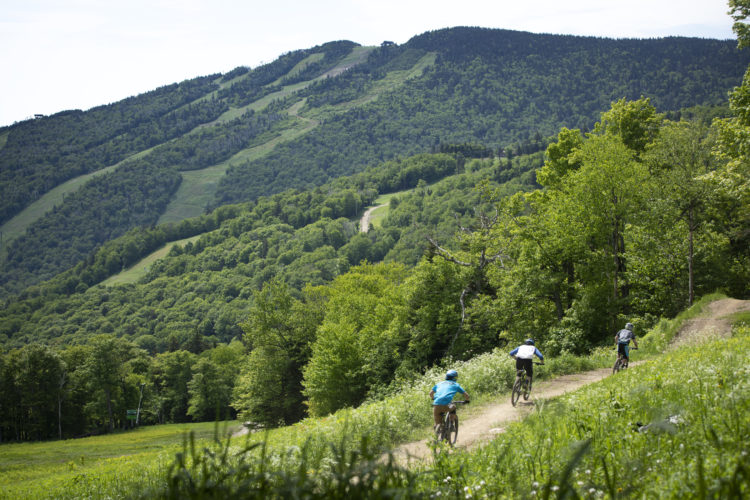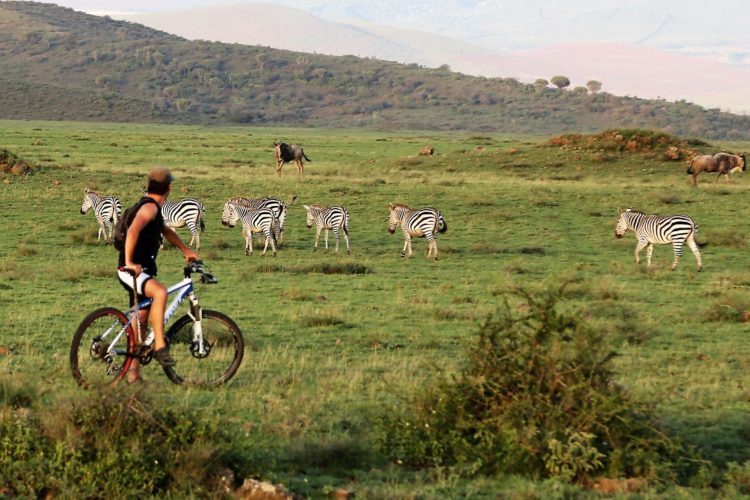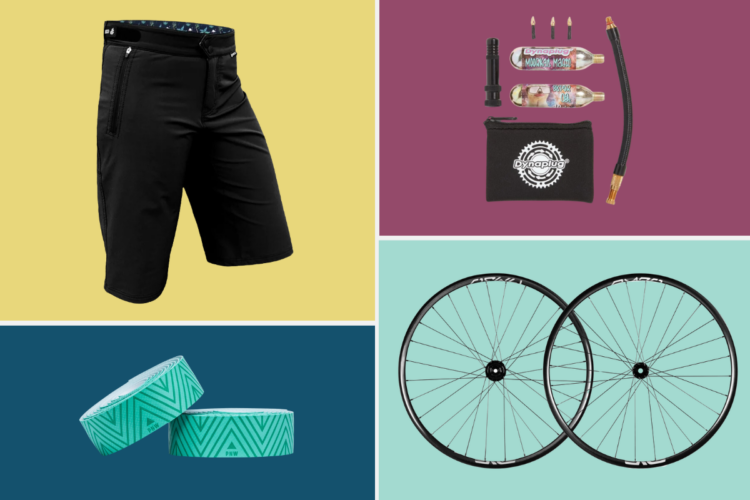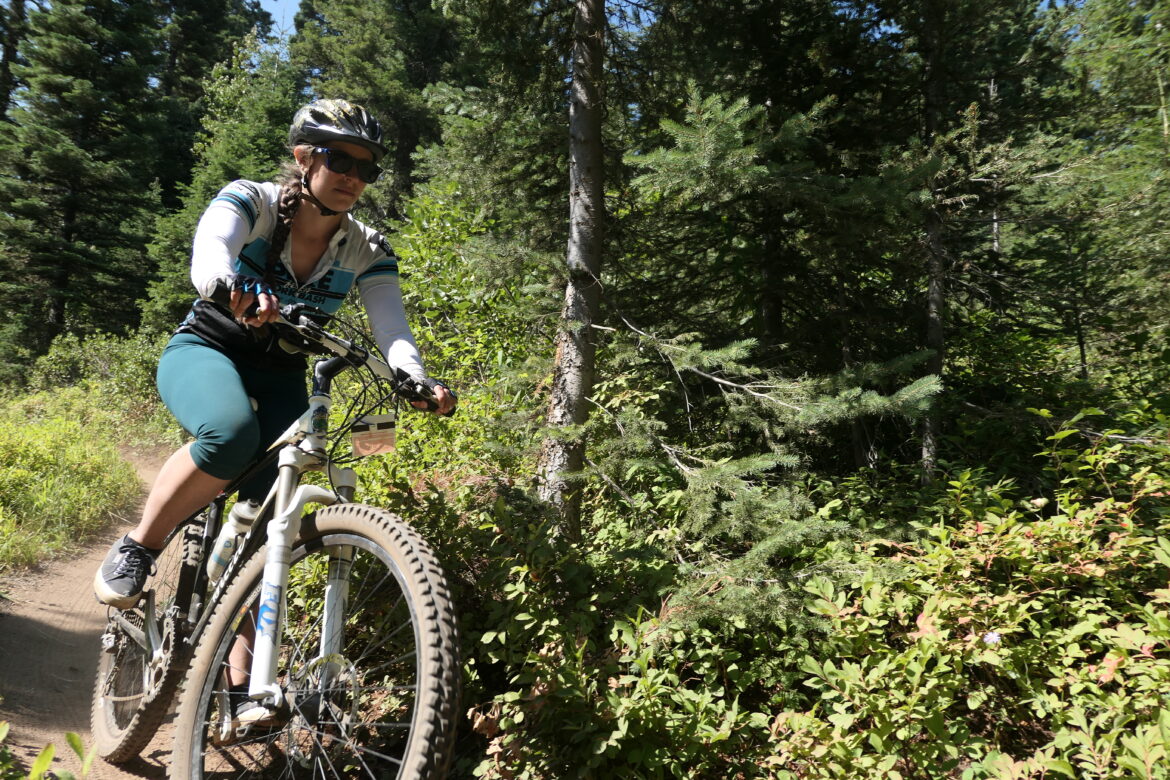
We push our bikes into the woods following a dusty descent down a rutted Forest Service road on the backside of Brundage Mountain ski area and find what we are looking for: the fresh duff of a virgin trail. We hop on our bikes and lay fresh tracks in the soft brown loam, pedaling into a rugged landscape of scraggly pines and gnarled standing deadwood bleached silver by the sun.
“This is beautiful,” I say to my wife, Katie, who is likewise mesmerized by the views and the opportunity to ride a trail not yet open to the public, in quiet solitude, before the weight of a thousand tires have carved a line — but also the dust, bumps and debris have been cleared.
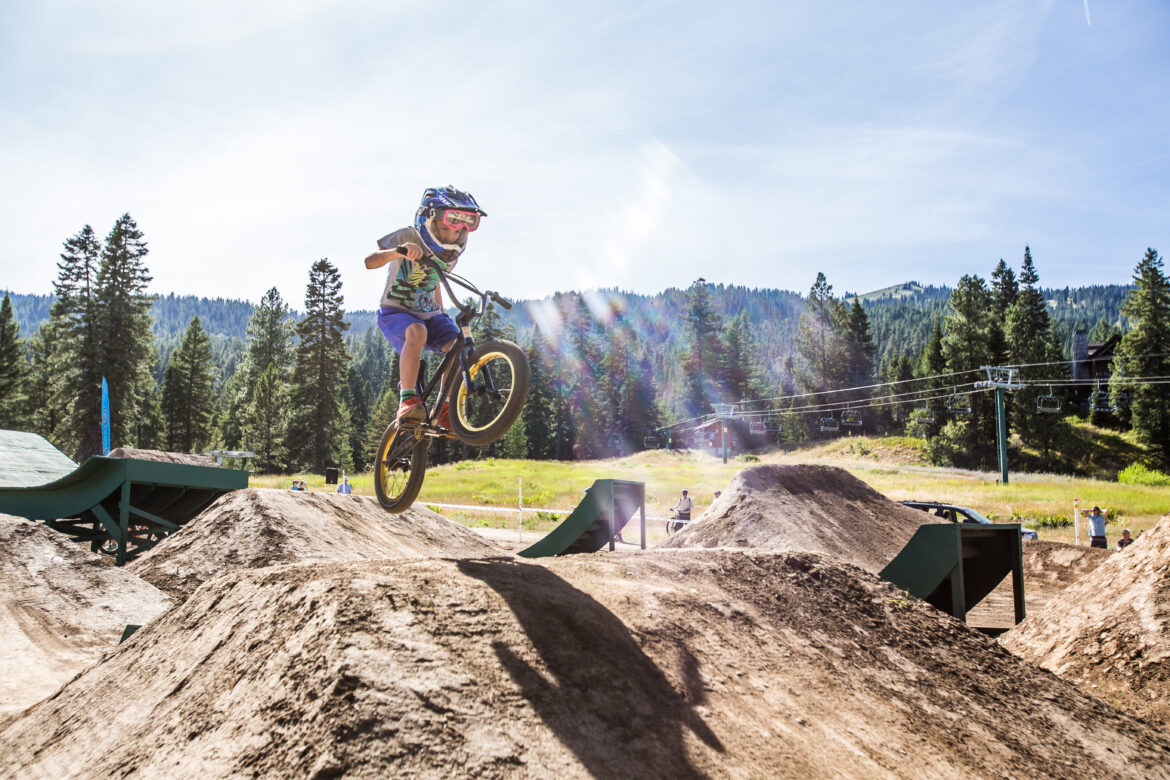
Brundage is a small and charming old-school ski area outside of McCall, Idaho, located at the base of the state’s panhandle, where we have road tripped from Seattle, seeking to explore the McCall area’s trails and do some COVID-safe traveling.
Ken Rider, the general manager of Brundage, had told us where to find this yet-to-be-named trail, which when finished in the fall or spring will create a 360-degree cross-country loop around Brundage’s summit, adding about four miles of new singletrack and connecting the Lakeview Vista trail to the Grouse trail through an area with no chairlifts, no visible roads, or any reminder of manmade infrastructure.
My nature reverie is broken when I hear my wife, who has dropped back 50-feet, make an audible sound, and I turn around to see a fox trotting behind me up the trail. The fox darts away into the pines, and we share a laugh. It seems a good omen that even the wildlife is enjoying this new trail.
We pedal onward, passing through damp and shady creek drainages, sunny meadows, and subalpine boulder fields until we come upon a three-man trail crew breaking ground. Dan Ashley, Brundage’s trail crew manager, steps off the excavator he is using to move rock and dirt to chat about their progress. “Fingers crossed we will open this trail in the spring.” Fifty yards ahead lies a massive talus field that will require moving tons of rock. “That segment is going to be hugely labor intensive,” he says. “All hand work.”
I mention the fox and Ashley smiles. “That little bastard stole my hat and sunglasses!” he says. “I put ‘em down on a rock to put on some bug spray and I was like, ‘hey, where did my shit go?’”
We take some pictures, thank the crew for their hard work, and then turn around and surf the loam back the way we came, following our knobby tracks—and some tiny paw prints—back into the ski area proper.
Back in the base area, Rider, wearing a face mask (Brundage requires masks in common areas and when boarding the chairlift), unfurls a large map of the region that shows the new singletrack we have just previewed as well as an 8.5-mile connector trail that will link Brundage and its 29 miles of trails to the Bear Basin ride center just outside of McCall.

“There is a huge mountain bike push here in the valley,” Rider says. “We are trying to connect all of these different trail hubs that exist around McCall. We have great trail hubs, but now we are building out the spokes, so to speak.”
The Brundage to Bear Basin Connector will be one of these crucial spokes. Mapped by Progressive Trail Design last summer, groundbreaking was set to begin this summer before the pandemic caused trail builders to hit the pause button. Now, work is set to begin next spring. Completing the Brundage to Bear Basin Connector will be a major milestone, allowing riders to pedal from downtown McCall to Brundage, passing through the Bear Basin trail hub, which consists of family-friendly, cross-country loops as well as the Drain flow trail.
The connector trail project is a partnership between the U.S. Forest Service, Brundage and the Central Idaho Mountain Bike Association, or CIMBA, the local IMBA affiliate. McCall is currently designated as a Silver ride center by IMBA, but CIMBA officers plan to push for a Gold designation one they have completed a slew of new trail construction projects and linkages that will raise McCall’s stature as a mountain bike travel destination.
McCall is a thriving mountain town of several thousand people located at 5,000 feet above sea level on the shores of Payette Lake, tucked amidst 8,000- and 9,000-foot peaks. Two ski areas, Brundage and Tamarack Resort, are located within a 30-minute drive in either direction, with the Bear Basin trail network located within riding distance of town and another trail hub that is gaining notoriety at nearby Jug Mountain Ranch, also a 15-minute drive from town.
With its skiing, water sports, hiking and mountain biking assets, McCall is a legit four-season adventure town on the rise. As a former resident of Tahoe and Colorado mountain towns, the thought of, “we could live here,” crossed my mind many times during our three days in McCall, which, as a bonus, offers multiple microbreweries.
“McCall is awesome,” says Rider, who took the job at Brundage following many years at Grand Targhee ski resort in Wyoming. His daughters compete on the McCall Area Composite Mountain Bike Team, the local NICA-affiliated high school race team, and Rider enthuses about the huge amount of camping opportunities, both in town at Ponderosa State Park and in the mountains surrounding the valley.

Katie and I take several lift-served descents at Brundage, whose trail network is small but scenic and invigorating, with 29 miles of trails that are more geared toward cross-country riding. Big bike riders who want to air it out will have more fun at Tamarack Resort, which has a bike park with jump lines and some more modern flow trails, but for a visiting cross-country rider Brundage is a great place to spend the day.
Brundage’s only black-diamond DH trail is an aggressive, old-school rocky skid down the fall line, built in the era before modern flow trails. “Our goal is to have a cross- country system that you can ride without using the lift, but which also gives people the option to use the lift to hit different trail segments,” Rider says. “Once we get the cross-country network built out, we will then focus on building some more modern downhill trails.”
Exhausted and thirsty, Katie and I head back to McCall and take a swim in the lake before meeting two CIMBA officers at the Salmon River Brewery, where we sit outside on a large patio overlooking the lake. As residents of Seattle, one of the first epicenters of COVID-19, we are accustomed to wearing masks whenever we leave the house. So it was a bit unnerving to see some people not wearing masks at the grocery store, despite a mandatory mask ordinance in town. Thankfully, all our servers are wearing masks at the brewery, where we sample the local IPAs and get the backstory on McCall’s rising stature as an MTB destination.
Dave Bingaman is CIMBA’s trail coordinator; Wayne Ruemmele the president. Both men moved to McCall more than 20 years ago after college, planning to spend a year but seduced by the recreational opportunities. Bingaman, an elected county commissioner, jokes that he may be the first Democrat to win a seat on the commission in decades. Chalk it up to his hard work and deep roots in McCall, with kids who race on the local high school team along with Rider’s. Ruemmele is an architect with more work than he can handle due to McCall’s housing boom.

I ask Ruemmele to describe McCall for prospective mountain bike tourists.
“We have two lift-served ski area within a half hour, Jug Mountain Ranch 15 minutes away with its flow trails, plus family friendly-trails at Bear Basin, and backcountry epics as remote as you want to get with thousands of miles of old logging roads,” Ruemmele says. No doubt, McCall owes much of its growing reputation and expanding trail network to the hard work of Bingaman, Ruemmele and other CIMBA volunteers. “It’s nice because you don’t have to drive out of town with your bikes to reach trailheads anymore.”
CIMBA was formed in 1997, at time when McCall had a lot of promise but little to no flowy singletrack. “We had a ton of remote trails, old logging roads and horse trails, but no flow. It was lots of big zig zag Z-cuts into the mountains, sometimes straight up the fall line.”
Bingaman interjects: “Lots of opportunities to take your bike for a long walk in the woods.”
In the early 2000s, Ruemmele attended an IMBA summit and came back fired up to help create a network of progressive trails built to modern, sustainable standards, and to grow mountain biking’s impact as a driver of economic development and quality of life in McCall. CIMBA partnered with the local Forest Service office and, with help from visiting IMBA trail crews, built the Bear Basin ride center.
“Bear Basin is a stacked loop trail system that provides something for people of all abilities,” says Ruemmele. Thanks to a new connector trail alongside highway 55, the main route into and out of town, people can now ride from downtown McCall to Bear Basin. Once the connector to Brundage is finished, the opportunity for epic long rides will be even greater.
“Our vision is to give people the opportunity to ride a 30- to 40-mile loop right from town with 5,000 feet of climbing,” Ruemmele continues. “We want mountain bikers to be able to visit for three days, stay in a hotel or camp, and be able to ride right from town and never get in their car, then end the day with a microbrew and a burger or pizza downtown.”

Mission partly accomplished. But more is coming.
Bingaman is now working on the Payette Lake Trail, which when completed will circumnavigate the lake at about 600 feet above the water, with stunning views a la the Tahoe Rim Trail. “I rode in Tahoe in 2010 and I was like, ‘we need to have something like that here,’” Bingaman says. “We just need to figure out how to build a stretch of trail through a rocky glacial moraine section and then we are off and running.”
Count me in for a return visit once that trail is completed.
The next morning, Katie and I load up our bikes and head to Tamarack Resort, which offers 25 miles of green, blue, black, and double-black trails, a bike park with jump lines and lift-served downhilling. We ride the cross-country trails, enjoying the views of Lake Cascade and stopping to grab a handful of huckleberries from the trailside bushes before taking off to explore Jug Mountain Ranch.
Jug Mountain Ranch is a modern subdivision of large homes with a golf course and a small lake—plus a growing trail network. Jug Mountain usually offers shuttle vans, but they aren’t operating during our visit due to the pandemic, so we pedal the cross-country trails on the lower mountain, getting lost in the maze of singletrack due to our poor map reading skills, but enjoying the loamy Idaho dirt. Despite being located on private land, the Jug Mountain Ranch trails are free. Bingaman befriended the landowner, took him mountain biking in Bend, and, yadayadayada, a new ride center was born.

Eatin Huckleberries. 
Author photo by AC Benson
Berm & Ernie is an intermediate to advanced flow trail at Jug Mountain with tabletops that can be aired or ridden over, making it a current favorite of local riders. “Berm and Ernie is super fun,” says Chris Renk, who drove up from Boise for a couple days of riding. “Jug Mountain is super versatile. You can ride downhill flow trails, hit some technical stuff or air out some jump lines. I love it.”
Sweaty and dusty, we split for town and, as is our preference when near cool and clean water, jump in the lake for another swim. We watch paddleboarders and water skiers enjoying themselves on the eight-square-mile lake, then spin back to our motel, the modern Scandia Inn, which we chose because of its COVID-safe precautions and convenient location in town. We crack a six pack and play a game of cornhole on the grass. I spot another mountain biker taking his bikes off a car rack at the Scandia and go over to say hello.
“McCall is great,” says Michael Miller, who drove from Bozeman, Montana, with his wife for a mountain biking road trip. “There’s a ton of riding, it’s a great beer town, and you can ride right from downtown. We come two to three times a year.”
As a newcomer to the Pacific Northwest who began exploring Idaho’s mountain biking scene last summer with a ramble through the Panhandle, visiting McCall was a revelation. It’s no Sun Valley, but thanks to the work of CIMBA it is a legitimate destination mountain bike town. Leaving early the next morning, our only regret was not staying longer. McCall is an eight- to nine-hour drive from Seattle, and about five hours south of our other favorite Idaho town, Sandpoint, which makes it well within striking distance for a four to five-day roadtrip from the Seattle area.
If you go, pack your swimsuit and face mask, and make sure to keep an eye out for a crafty fox wearing a hat and sunglasses.















